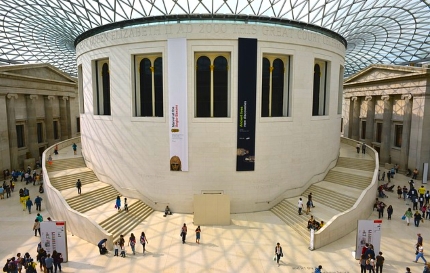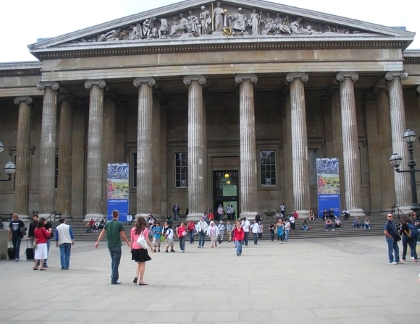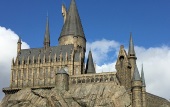Top museum of the extra class, free admission
The British Museum is one of the largest and most important museums in the world. It is a classic history museum for all eras from the Stone Age to the present day. In total there are about 8 million objects on display. Every year about 5 million visitors come to the British Museum. The gigantic exhibition is free of charge for all visitors.
Tours through the British Museum London: Of course good tours in groups are also available and can be found on this website.

Superlative British Museum
The British Museum is considered the oldest museum in the world, open to the public and still in existence (founded 1753).
According to some statistics, it is currently the most visited museum in the world. Of course, the fact that it does not cost an entrance fee helps.
The British Museum is considered to be the largest museum on earth, at least in terms of the number of objects on display. It is 8 million. Unbelievable. If you look at each object for only 10 seconds, you would need about 2,5 years. No one, not even a museum employee, can have seen everything in the largest of all exhibitions.
The new, futuristic entrance hall by Sir Norman Foster (see picture above) is considered to be the largest public building in Europe. It is bigger than a football pitch.
The reading room is still one of the largest in the world, with over 300,000 books. It used to be the home of the entire British Library. Karl Marx, Charles Dickens, Lenin and other celebrities regularly read millions of books here. The British Library moved to a new, larger building near St Pancras station in 1998.
Here Karl Marx wrote his book “Das Kapital“. It is one of the most controversial works of world literature, but still the most famous book in economics.
Tickets for the London Eye Ferris wheel can be found on this great website
What do I have to look at?
There are almost endless highlights in the British Museum. Quite a few visitors and historians consider the Egyptian and Ancient Greek collections to be the most important areas in the British Museum.
The most famous unique piece in the Bristish Museum is the world-famous Rosetta Stone. With its help the Egyptian hieroglyphs were deciphered. The stone of Rosetta has the same long text in three languages (hieroglyphics, demotic, ancient Greek). With the help of the stone the Egyptian characters could be decoded with the help of the Greek translation. Also the Egyptian mummies and the Greek statues attract many visitors.
The frieze of Parthenon: The Pantheon is a temple on the Acropolis in Athens. The frieze is a decoration surrounding parts of the building. It is world famous.
Lindow-Man: A corpse about 2,000 years old that was found very well preserved in a moor. In England it is similarly known as the Ötzi from the Alps.
Kyros cylinder from Persia (today Iran), 6th century BC. For the first time in known history something like human rights were formulated.
Lewis Chessmen: Very famous chess pieces from the Middle Ages (Origin Scandinavia)
We liked the department clocks, movement and time. You can see large clocks, pocket watches from the 16th century and much more. The highlight of this section of the British Museum for us was the Mechanical Galleon (mechanical gallone), which was probably made in Augsburg at the end of the 16th century. It is a ship model with an incredible number of details made of metal, which was also a clock. Absolutely worth seeing.
The museum building itself is also worth seeing. In particular, the covered inner courtyard designed by Sir Norman Foster some 15 years ago is spectacular. It is the largest covered square in Europe. In the middle of the huge room is the large, old reading room of the British Museum.

Further information
Tours through the British Museum London: Of course this is also available and can be found on this link.
Opening hours British Museum 2025 : The opening hours are simple: daily from 10:00 to 17:30, on Friday even until 20:30. Exceptions are only some holidays like Christmas and New Year.
Entry fees British Museum 2025: This is even easier. Admission to the British Museum is free! Exceptions are special exhibitions for which an entrance fee is sometimes charged. The museum is financed by the British government.
How to get to the British Museum: Less than 500 metres from the British Museum are the following underground stations; Holborn (near the main entrance), Tottenham Court Road, Goodge Street and Russell Square. Bicycle parking is available. The museum is easily accessible by public transport. Those coming by car will have a problem finding a parking space nearby.
Bus tour from London to Stonehenge
You go by bus 2.5 hours there and 2.5 hours back. In between you are 2-3 hours in Stonehenge. You can have a look at the stone circles and the exhibition in the visitor centre. You will be informed with an audio device (available in many languages including of course English). The journey takes about 7 hours, departure is at 2 pm in summer and earlier in winter.
––>>>>> More information and booking on this link
Other top museums in London are the Tate Modern Museum and the National Gallery.
Everything about Siena Italy, a grandiose city in the heart of Tuscany.
Venice Da Vinci Museum, all information and tickets.
A worldwide Backpacker Guide on the internet.
Tip: Harry Potter excursion (Warner Brothers Studio Tour)
One of the popular excursions in London is to the film studios, On this page you can find more info and book the tour. |
All Highlights British Museum London
The British Museum in London is one of the world’s leading museums with an extensive collection of art, artefacts and historic buildings from around the world. With more than 8 million objects in the collection, deciding what to see can be overwhelming. Here are the main highlights of the British Museum.
Rosetta Stone
Parthenon Sculptures
Egyptian Mummies
Lewis Chessmen
Late Roman
Silver Bowl
Gayer-Anderson Cat
Benin Bronzes
Sutton-Hoo-Helm
Assyrian Lion Hunt Reliefs
Egyptian Book of the Dead
Samurai Armour
Easter Island Statue (Moai)
Standard of Ur
Nereid Monument
Hoa Hakananai’a (Easter Island Statue)
Elgin Marbles
Colossal Bust of Amenhotep III
Portland vase
Aztec double-headed snake
Papyrus of Ani
Mexican turquoise mosaic mask
Cyrus cylinder
British Museum reading room
Lindow Man (bog body)
Maori meeting house
Roman silver bowl
Chinese jade funeral suit
Mayan Staircase with Hieroglyphics
Moche Portrait Head
Rembrandt’s Self Portrait
African Elephant (Dürer)
Nereid Monument Frieze
Oseberg Ship
Sculpture from the Vijayanagara Temple
African Ancestor Figure in Wood
Lewis’s Gneiss Rock
Head of Augustus
Haida Totem Pole
Oxus TreasureIfe
HeadIvory Bracelet Lady
King Game of Ur
Ninive Lion Weights
Mathematical Papyrus of Rhind
Late Roman Gold Necklace
Aztec Mosaic Mask
African Headrest
Old Egyptian Figurines
Hadrian’s Wall
Dendera Zodiac
Egyptian Temple of Dendur
Flint hand axe
African wooden Senufo bird
Hellenistic bronze statue of a boxer
Chinese horse from the Tang Dynasty
Colossal bust of Ramses II.
Limestone relief from Nineveh (Ninive)
Japanese print of the Great Wave
Assyrian palace reliefs
Uruk vase
Coptic textiles
Akan gold weights
Gayer-Anderson- Chair
Greek crater
Mexican relief sculptureBird-shaped pipe
Assyrian winged genie
Roman sarcophagus
Ancient Greek pottery
Japanese calligraphy from the Heian period
Mexican feathered serpent
Mamluke glass mosque lamp
Anglo-Saxon buckle
Persian carpetItalian
Renaissance bronze sculptureIslamic tiles
Korean mother-of-pearl inlaid cabinet
Anglo-Saxon gold buckle
Hellenistic bronze statue of a dancing satyr
Persian relief sculpture
Wikings silver treasure
Chinese porcelain
Medieval Islamic pottery
Chinese cloisonné vase from the 19th century.
Aztec flint knife
Hellenistic bronze statue of a sleeping satyr
Medieval ivory chess piece
Mexican turquoise mosaic shield
Japanese painting from the 18th century
Porcelain vase from the Ming dynasty
Tours through the British Museum London: Of course this is also available and can be found on this link.


